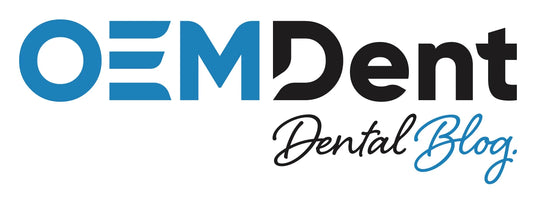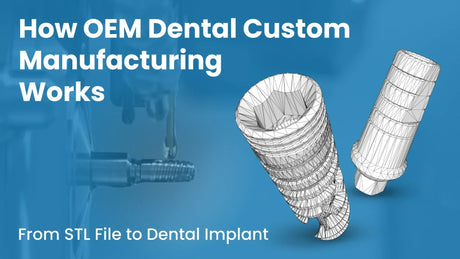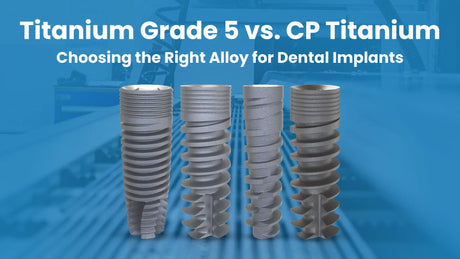

From STL to Implant: How OEM Dent Custom Manufacturing Works
For distributors and labs, staying competitive isn’t just about buying reliable dental components, it’s about having the ability to create products that stand out. Building a private-label implant line or offering customized abutments is one of the fastest ways to differentiate in today’s crowded market.
But how do you get from an idea or digital design to a finished product that’s ready for use in a clinical setting? At OEM Dent, we make this process simple. By combining advanced engineering, strict quality standards, and flexible production, we help businesses transform their designs into fully manufactured implants, abutments, and tools.
Here’s a step-by-step look at how the process works.
Step 1: Starting with Design Files
The process begins when a client provides us with a detailed drawing, STL file, or technical specifications. This file serves as the blueprint for the component — whether it’s an implant, abutment, or instrument.
-
STL files generated by CAD/CAM systems can be used directly.
-
Technical sketches or spec lists can be converted into STL files by our engineering team.
-
Adjustments are made to ensure precision and compatibility with the requested platform.
This flexibility means distributors and labs don’t need to maintain their own design departments. OEM Dent can bridge the gap between concept and production.
Step 2: Engineering and Compatibility
Once the design is received, our product development team carefully evaluates it. This includes:
-
Checking tolerances against clinical standards.
-
Ensuring platform compatibility (internal hex, conical connection, and others).
-
Making refinements for restorative fit and mechanical strength.
Each design is calibrated to perform reliably in real-world clinical use — not just on paper.
Step 3: Choosing Materials
The choice of material is central to both performance and branding. OEM Dent offers a wide range of options:
-
Titanium Grade 5 (Ti-6Al-4V ELI): Lightweight, strong, highly corrosion resistant, and biocompatible — the gold standard for implants and abutments.
-
Titanium CP: For components requiring extra purity.
-
Chrome-Cobalt Alloys: Excellent for strength and prosthetic durability.
-
Medical-grade Stainless Steel (SS303, SS316/316L, SS420): Ideal for surgical tools and analogs.
-
High-performance polymers (PEEK, POM, PMMA): Used in temporary abutments and prosthetics.
Custom materials not on this list can sometimes be approved after review, offering even greater flexibility.
Step 4: Surface Treatments and Customization
Surface technology plays a critical role in implantology. OEM Dent provides two surface treatment options for implants:
-
SLA (Sandblasted, Large Grit, Acid-etched): Widely documented to accelerate osseointegration and improve long-term stability.
-
RBM (Resorbable Blast Media): Designed for enhanced bone response.
In addition, titanium anodizing can be applied to components for color-coded customization, helping with identification and branding.
Step 5: Production and Lead Time
With design and materials finalized, production begins. OEM Dent uses advanced machinery to ensure precision and consistency.
-
Minimum Order Quantities (MOQ):
-
100 units for implants
-
200 units for components or tools
-
Lead Time: 2–3 weeks from finalizing the order
-
Volume-based pricing: Larger quantities lower the unit cost, helping distributors improve margins.
For B2B buyers, this makes scaling predictable and cost-effective.
Step 6: Quality Control and Packaging
OEM Dent takes quality control seriously at every stage:
-
Rigorous, multi-step inspections ensure precision.
-
All products are traceable by reference and batch number.
-
Packaging is completed in an ISO 7 Class 10,000 Cleanroom.
-
Each order undergoes multiple QC checks before shipping.
The result is a product that meets international performance and safety standards, ready for distribution or clinical use.
Step 7: Private Label Options
Custom manufacturing is only part of the journey. For distributors and labs who want to launch their own brand, OEM Dent offers private-label services that include:
-
Logo and packaging design
-
Labeling
-
Catalogs and brochures
-
Explainer materials and business cards
This makes it possible to not only manufacture your own implant line but also present it with professional branding to your market.
Why This Matters for Distributors and Labs
Custom manufacturing allows businesses to:
-
Differentiate: Build exclusive product lines rather than reselling generic parts.
-
Improve margins: Take advantage of bulk pricing and private labeling.
-
Scale quickly: Move from small runs to larger orders without new infrastructure.
-
Build trust: Offer products backed by strict QC and cleanroom packaging.
OEM Dent’s system was built for B2B buyers who want reliable, cost-effective solutions without compromising quality.
Key Takeaways Checklist
-
Input: STL files, drawings, or specifications.
-
Engineering: Compatibility and tolerance checks.
-
Materials: Titanium Grade 5, Co-Cr, stainless steel, and polymers.
-
Customization: SLA or RBM surfaces, anodizing options.
-
MOQ: 100 implants, 200 components; 2–3 week production time.
-
QC: ISO-certified cleanroom packaging and traceability.
-
Private Label: Branding and marketing support included.
FAQs
1. What if I don’t have an STL file?
You can send a sketch or specification sheet — our engineers will create the STL.
2. What’s the minimum order size?
100 implants or 200 components/tools.
3. How long does manufacturing take?
Typically 2–3 weeks from final order confirmation.
4. Can I request custom materials?
Yes, non-standard materials can be reviewed and approved.
5. Do you provide branding support?
Yes. OEM Dent offers full private-label services including packaging, labeling, and catalogs.
Final Takeaway
From a digital file to a fully branded implant line, OEM Dent makes custom manufacturing practical and cost-effective for distributors, labs, and clinics. With advanced engineering, strict QC, and private-label options, we help B2B buyers bring their vision to life — without the costs of in-house production.
To explore how this process can work for your business, visit our OEM services page.
References
-
Buser D, Nydegger T, Oxland T, Cochran DL, Schenk RK, Hirt HP, Snetivy D, Nolte LP. Interface shear strength of titanium implants with SLA surfaces: a biomechanical study. J Biomed Mater Res. 1999;45(2):75-83.
https://pubmed.ncbi.nlm.nih.gov/10397960/ -
Elias CN, Lima JHC, Valiev R, Meyers MA. Biomedical applications of titanium and its alloys: The material of choice. Prog Mater Sci. 2008;53(5):848-873.
https://meyersgroup.ucsd.edu/papers/journals/Meyers%20316.pdf -
Schwitalla AD, Müller WD. PEEK dental implants: a review of the literature. J Oral Implantol. 2013;39(6):743-749. https://pubmed.ncbi.nlm.nih.gov/21905892/

OEMDent.com offers uncompromised quality, cost-effective dental implants & prosthetics compatible with leading implant systems. We go beyond manufacturing, offering OEM & Private Label services to meet your dental needs.






